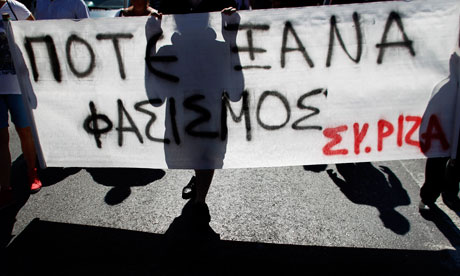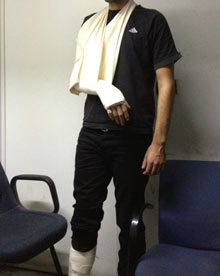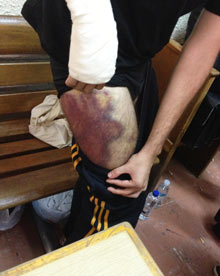
Protesters carry a
banner that reads Fascism Never Again, during a protest in Pireaus near
Athens. Photograph: Kostas Tsironis/AP
Fifteen anti-fascist protesters arrested in Athens during a
clash with supporters of the neo-Nazi party Golden Dawn have said they
were tortured in the Attica General Police Directorate (GADA) – the
Athens equivalent of Scotland Yard – and subjected to what their lawyer
describes as an Abu Ghraib-style humiliation.
Members of a second group of 25 who were arrested after demonstrating in support of their fellow anti-fascists the next day said they were beaten and made to strip naked and bend over in front of officers and other protesters inside the same police station.
 A protester shows his injuries
Several of the protesters arrested after the first demonstration on
Sunday 30 September told the Guardian they were slapped and hit by a
police officer while five or six others watched, were spat on and "used
as ashtrays" because they "stank", and were kept awake all night with
torches and lasers being shone in their eyes.
A protester shows his injuries
Several of the protesters arrested after the first demonstration on
Sunday 30 September told the Guardian they were slapped and hit by a
police officer while five or six others watched, were spat on and "used
as ashtrays" because they "stank", and were kept awake all night with
torches and lasers being shone in their eyes.
 Bruising on the protester's leg
Some said they were burned on the arms with a cigarette lighter, and
they said police officers videoed them on their mobile phones and
threatened to post the pictures on the internet and give their home
addresses to Golden Dawn, which has a track record of political
violence.
Bruising on the protester's leg
Some said they were burned on the arms with a cigarette lighter, and
they said police officers videoed them on their mobile phones and
threatened to post the pictures on the internet and give their home
addresses to Golden Dawn, which has a track record of political
violence.
Golden Dawn's popularity has surged since the June election, when it won 18 seats in parliament; it
recently came third in several opinion polls, behind the conservative New Democracy and the leftwing party Syriza.
Last month the Guardian reported that victims of crime have been told by police officers to seek help from Golden Dawn, who then felt obliged to make donations to the group.
One of the two women among them said the officers used crude sexual insults and pulled her head back by the hair when she tried to avoid being filmed. The protesters said they were denied drinking water and access to lawyers for 19 hours. "We were so thirsty we drank water from the toilets," she said.
One man with a bleeding head wound and a broken arm that he said had been sustained during his arrest alleged the police continued to beat him in GADA and refused him medical treatment until the next morning. Another said the police forced his legs apart and kicked him in the testicles during the arrest.
"They spat on me and said we would die like our grandfathers in the civil war," he said.
A third said he was hit on the spine with a Taser as he tried to run away; the burn mark is still visible. "It's like an electric shock," he said. "My legs were paralysed for a few minutes and I fell. They handcuffed me behind my back and started hitting and kicking me in the ribs and the head. Then they told me to stand up, but I couldn't, so they pulled me up by the chain while standing on my shin. They kept kicking and punching me for five blocks to the patrol car."
The protesters asked that their names not be published, for fear of reprisals from the police or Golden Dawn.
A second group of protesters also said they were "tortured" at GADA. "We all had to go past an officer who made us strip naked in the corridor, bend over and open our back passage in front of everyone else who was there," one of them told the Guardian. "He did whatever he wanted with us – slapped us, hit us, told us not to look at him, not to sit cross-legged. Other officers who came by did nothing.
"All we could do was look at each other out of the corners of our eyes to give each other courage. He had us there for more than two hours. He would take phone calls on his mobile and say, 'I'm at work and I'm fucking them, I'm fucking them up well'. In the end only four of us were charged, with resisting arrest. It was a day out of the past, out of the colonels' junta."
In response to the allegations, Christos Manouras, press spokesman for the Hellenic police, said: "There was no use of force by police officers against anyone in GADA. The Greek police examine and investigate in depth every single report regarding the use of violence by police officers; if there are any responsibilities arising, the police take the imposed disciplinary action against the officers responsible. There is no doubt that the Greek police always respect human rights and don't use violence."
Sunday's protest was called after a Tanzanian community centre was vandalised by a group of 80-100 people in a central Athens neighbourhood near Aghios Panteleimon, a stronghold of Golden Dawn where there have been many violent attacks on immigrants.
According to protesters, about 150 people rode through the neighbourhood on motorcycles handing out leaflets. They said the front of the parade encountered two or three men in black Golden Dawn T-shirts, and a fight broke out. A large number of police immediately swooped on them from the surrounding streets.
According to Manouras: "During the motorcycle protest there were clashes between demonstrators and local residents. The police intervened to prevent the situation from deteriorating and restore public order. There might have been some minor injuries, during the clashes between residents, protesters and police."
Marina Daliani, a lawyer for one of the Athens 15, said they had been charged with "disturbing the peace with covered faces" (because they were wearing motorcycle helmets), and with grievous bodily harm against two people. But, she said, no evidence of such harm had so far been submitted. They have now been released on bail of €3,000 (£2,400) each.
According to Charis Ladis, a lawyer for another of the protesters, the sustained mistreatment of Greeks in police custody has been rare until this year: "This case shows that a page has been turned. Until now there was an assumption that someone who was arrested, even violently, would be safe in custody. But these young people have all said they lived through an interminable dark night.
Dimitris Katsaris, a lawyer for four of the protesters, said his clients had suffered Abu Ghraib-style humiliation, referring to the detention centre where Iraqi detainees were tortured by US soldiers during the Iraq war. "This is not just a case of police brutality of the kind you hear about now and then in every European country. This is happening daily. We have the pictures, we have the evidence of what happens to people getting arrested protesting against the rise of the neo-Nazi party in Greece. This is the new face of the police, with the collaboration of the justice system."
One of the arrested protesters, a quiet man in his 30s standing by himself, said: "Journalists here don't report these things. You have to tell them what's happening here, in this country that suffered so much from Nazism. No one will pay attention unless you report these things abroad."
Members of a second group of 25 who were arrested after demonstrating in support of their fellow anti-fascists the next day said they were beaten and made to strip naked and bend over in front of officers and other protesters inside the same police station.
 A protester shows his injuries
Several of the protesters arrested after the first demonstration on
Sunday 30 September told the Guardian they were slapped and hit by a
police officer while five or six others watched, were spat on and "used
as ashtrays" because they "stank", and were kept awake all night with
torches and lasers being shone in their eyes.
A protester shows his injuries
Several of the protesters arrested after the first demonstration on
Sunday 30 September told the Guardian they were slapped and hit by a
police officer while five or six others watched, were spat on and "used
as ashtrays" because they "stank", and were kept awake all night with
torches and lasers being shone in their eyes. Bruising on the protester's leg
Some said they were burned on the arms with a cigarette lighter, and
they said police officers videoed them on their mobile phones and
threatened to post the pictures on the internet and give their home
addresses to Golden Dawn, which has a track record of political
violence.
Bruising on the protester's leg
Some said they were burned on the arms with a cigarette lighter, and
they said police officers videoed them on their mobile phones and
threatened to post the pictures on the internet and give their home
addresses to Golden Dawn, which has a track record of political
violence.Golden Dawn's popularity has surged since the June election, when it won 18 seats in parliament; it
recently came third in several opinion polls, behind the conservative New Democracy and the leftwing party Syriza.
Last month the Guardian reported that victims of crime have been told by police officers to seek help from Golden Dawn, who then felt obliged to make donations to the group.
One of the two women among them said the officers used crude sexual insults and pulled her head back by the hair when she tried to avoid being filmed. The protesters said they were denied drinking water and access to lawyers for 19 hours. "We were so thirsty we drank water from the toilets," she said.
One man with a bleeding head wound and a broken arm that he said had been sustained during his arrest alleged the police continued to beat him in GADA and refused him medical treatment until the next morning. Another said the police forced his legs apart and kicked him in the testicles during the arrest.
"They spat on me and said we would die like our grandfathers in the civil war," he said.
A third said he was hit on the spine with a Taser as he tried to run away; the burn mark is still visible. "It's like an electric shock," he said. "My legs were paralysed for a few minutes and I fell. They handcuffed me behind my back and started hitting and kicking me in the ribs and the head. Then they told me to stand up, but I couldn't, so they pulled me up by the chain while standing on my shin. They kept kicking and punching me for five blocks to the patrol car."
The protesters asked that their names not be published, for fear of reprisals from the police or Golden Dawn.
A second group of protesters also said they were "tortured" at GADA. "We all had to go past an officer who made us strip naked in the corridor, bend over and open our back passage in front of everyone else who was there," one of them told the Guardian. "He did whatever he wanted with us – slapped us, hit us, told us not to look at him, not to sit cross-legged. Other officers who came by did nothing.
"All we could do was look at each other out of the corners of our eyes to give each other courage. He had us there for more than two hours. He would take phone calls on his mobile and say, 'I'm at work and I'm fucking them, I'm fucking them up well'. In the end only four of us were charged, with resisting arrest. It was a day out of the past, out of the colonels' junta."
In response to the allegations, Christos Manouras, press spokesman for the Hellenic police, said: "There was no use of force by police officers against anyone in GADA. The Greek police examine and investigate in depth every single report regarding the use of violence by police officers; if there are any responsibilities arising, the police take the imposed disciplinary action against the officers responsible. There is no doubt that the Greek police always respect human rights and don't use violence."
Sunday's protest was called after a Tanzanian community centre was vandalised by a group of 80-100 people in a central Athens neighbourhood near Aghios Panteleimon, a stronghold of Golden Dawn where there have been many violent attacks on immigrants.
According to protesters, about 150 people rode through the neighbourhood on motorcycles handing out leaflets. They said the front of the parade encountered two or three men in black Golden Dawn T-shirts, and a fight broke out. A large number of police immediately swooped on them from the surrounding streets.
According to Manouras: "During the motorcycle protest there were clashes between demonstrators and local residents. The police intervened to prevent the situation from deteriorating and restore public order. There might have been some minor injuries, during the clashes between residents, protesters and police."
Marina Daliani, a lawyer for one of the Athens 15, said they had been charged with "disturbing the peace with covered faces" (because they were wearing motorcycle helmets), and with grievous bodily harm against two people. But, she said, no evidence of such harm had so far been submitted. They have now been released on bail of €3,000 (£2,400) each.
According to Charis Ladis, a lawyer for another of the protesters, the sustained mistreatment of Greeks in police custody has been rare until this year: "This case shows that a page has been turned. Until now there was an assumption that someone who was arrested, even violently, would be safe in custody. But these young people have all said they lived through an interminable dark night.
Dimitris Katsaris, a lawyer for four of the protesters, said his clients had suffered Abu Ghraib-style humiliation, referring to the detention centre where Iraqi detainees were tortured by US soldiers during the Iraq war. "This is not just a case of police brutality of the kind you hear about now and then in every European country. This is happening daily. We have the pictures, we have the evidence of what happens to people getting arrested protesting against the rise of the neo-Nazi party in Greece. This is the new face of the police, with the collaboration of the justice system."
One of the arrested protesters, a quiet man in his 30s standing by himself, said: "Journalists here don't report these things. You have to tell them what's happening here, in this country that suffered so much from Nazism. No one will pay attention unless you report these things abroad."

No comments:
Post a Comment